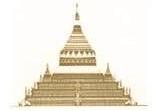Practice

Knowledge of Abhidhamma can help us in meditation as well as in daily life.
Abhidhamma is like a mental map.
But with a road-, city- or hiking-map alone we do not arrive at the destination. We must have learned to read the map and be able to interpret it, but above all we have to set off and walk ourselves. A map has no end in itself. But no matter where we want to go or what we are searching, with a good, exact and complete map we will reach our goal safely. Without map or without understanding it our way will be a trial and error journey, probably with a lot of detours, dead ends, stumbling blocks and hindrances. If and when we will reach the goal, is doubtful.
Or we are lucky enough to be able to confide ourselves in an experienced mountain-guide – that is to say to practise under the guidance of an experienced master. This can save many detours, wrong tracks and a lot of time and energy. If one does not have or find such an experienced teacher or guide or does not want to totally depend on him or her, it is better to take the doctrine itself as teacher. As the Buddha had said: "The Dhamma may be your teacher, your refuge, your light..."
Examples of application:
Ottappa – fear of consequences, if we would act immorally - therefore we show consideration and abstain from immoral deeds;
Saṃvega – fear of "conditioned phenomena", of transitoriness and death... - this leads to a sense of urgency and to vīriya (effort and energy) in our practice, what indeed is good.
 With Abhidhamma-knowledge we understand better which qualities to develop and how. If we know the conditions which make us happy and free, we can try to create them or strengthen them. And learning how our mind works and functions, we can apply these natural laws for our own goals.
With Abhidhamma-knowledge we understand better which qualities to develop and how. If we know the conditions which make us happy and free, we can try to create them or strengthen them. And learning how our mind works and functions, we can apply these natural laws for our own goals.

